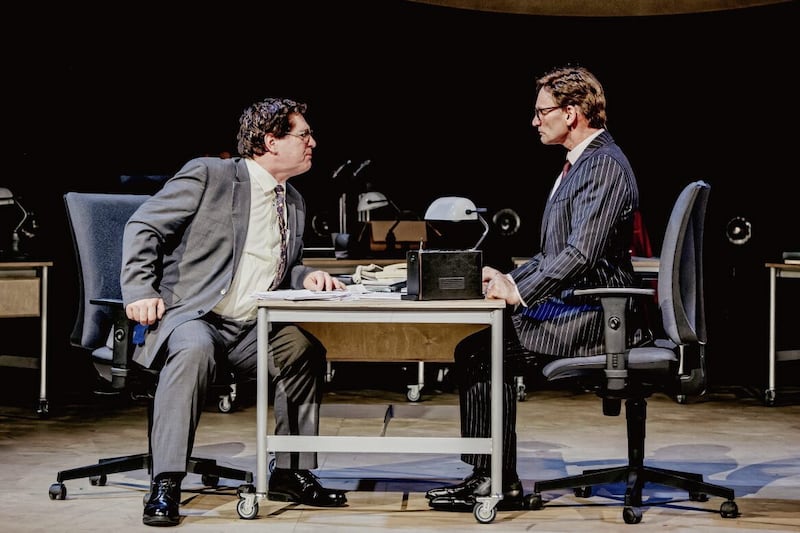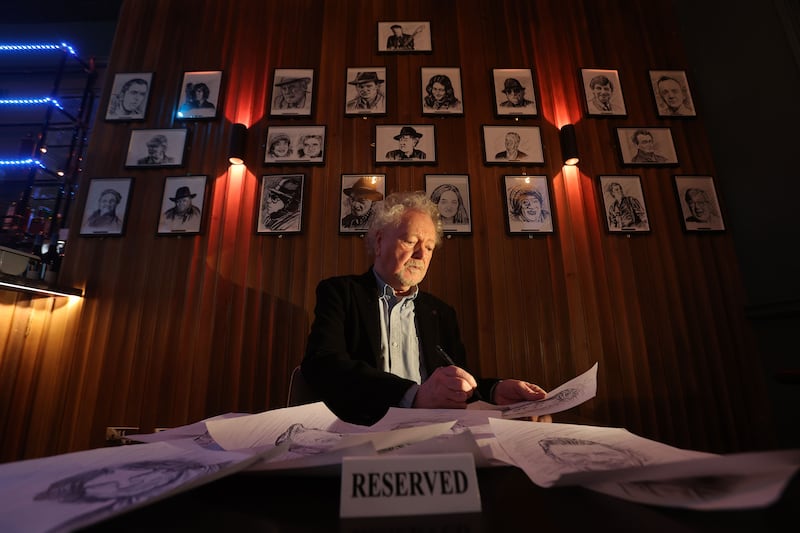"EVERY day is my own - freedom, no more clock watching."
There speaks a happy man who has fulfilled his working life with great skill and dignity. Some 44,000 news bulletins over the last 44 years, taking the latest stories - be they happy or sad - and delivering them to us in measured tones. And now Keith Burnside has retired, last week he was relaxing, making plans, meeting friends and colleagues for lunch, being with his family and looking forward to his new existence.
Keith is something of a modest star of radio and television. He has worked in all outlets - UTV, GMTV, Downtown, BBC - in news coverage. He also took over from Charles Witherspoon to present Police 6, a programme that had a great following and tremendous results, then launching Crimecall in 1994, appealing for information on everything from specialist drawing pens nicked from Belfast shipyard to looking for someone to come forward and claim 34 pairs of men's jeans.
He has seen and reported on dreadful days during The Troubles and he was on duty the day of 9/11 when the horror of rolling news reached a new level.
Two personal events stand out: "The day I had to report that my great buddy Lynda Jayne Caithness had died, and when my own mother passed away. Lynda Jayne helped me settle into working with Downtown, she was kind and thoughtful, and 12 months later I had to bring the tragic news to the public."
The media outlets agreed that, although she had died some hours earlier, it would be aired on the nine o'clock bulletin that morning in April 2000 and the news rocked listeners in Northern Ireland. He closed with the heartfelt words: "And that's the news on the day that Lynda Jayne Caithness has died."
"Then, when my mum went into a nursing home, I'd a photo taken in the newsroom for her bedside table."
It was beside her when she tuned into the news first thing every morning to hear her son and then take his phone call a few minutes later for a chat. They were very close and when she passed away Keith still had to do the morning bulletin knowing that for the first time in his life she wasn't there to hear him, there would be no more phone calls.
Time Marches On
"There have been many changes during my 44 years, obviously technically but also with the people," explains Keith.
"I learned from professionals who 'let the story crystallise' before preparing the bulletin, taking time to consider the words and emphasis - preparing for live broadcasting needs careful preparation. More often today, news broadcasts are largely driven from a desk and by pressing buttons on computer consoles.
"Undoubtedly technology has moved on and speed is of the essence and basically, since the pandemic, a lot is pre-recorded with a live element in case there were any changes at the last minute.
"I've always thought broadcasting is like being a snooker player having to look two or three shots ahead - one eye on the time and the other being prepared for any hiccups and how to cope.
"I once introduced Barra Best but the machine slowed down and the audio didn't come up so, to fill time, I pretended to chat to him, asking 'Are you there Barra?' and, that gave time for the tape to catch up. I can honestly say I have learned something every day."
With 44,000 bulletins in his professional life, how was his last day with BBC after 20 years with the broadcaster?
"Emotional. In March I told management I was going to retire once the pension kicked in but I didn't want any fuss, so when the day came on June 3 I was touched when so many friends in the building came to shake my hand and wish me well and social media went mad but it really only came home to me when the postman knocked the door on Wednesday and said: 'I hear you've retired, all the best.'"
Retirement Doesn't Mean Languishing
For years Keith has been an enthusiastic ham radio operator and when a former colleague got in touch with him three months ago the news was exciting.
"Jim Lee, Radio 4 newsreader, contacted me to say we'd been granted permission to use a special call sign to celebrate the 100th birthday of the BBC. We'll be able to use GB100BBC around the UK and he asked me to organise it here in Northern Ireland," he says.
Yesterday, Keith was involved in setting up a shortwave station at Broadcasting House.
"Tomorrow, we go to to Divis mountain transmitter site and set up a VHF (very high frequency) and UHF (Ultra high frequency) station and begin transmitting throughout Ireland and into parts of Scotland."
But there's a serious side to this hobby. "As a member of RAYNET, radio amateurs emergency network, we provide communications when medical teams are needed urgently, for instance, if there's a natural disaster, at sporting events like the North West 200 race, also we can provide assistance in extreme weather conditions when communities are cut off."
As well as this, Keith is proficient in sending messages to other radio operators via Morse code. "When people say, I suppose you don't tweet, I tell them as a radio ham I've been sending short, fast, instant messages all my life thanks to Morse code."
But it could all have been very different. When he was just nine years old he had his left kidney removed. There was a chance it might have been cancerous but fortunately it wasn't. When his parents arrived the surgeon told them it all went well. "But, he said, I have another small operation to perform. I'm going to take his tongue out. He talks too much"
Good thing for us that surgeon didn't carry out his threat. Thanks Keith, enjoy your busy retirement.








